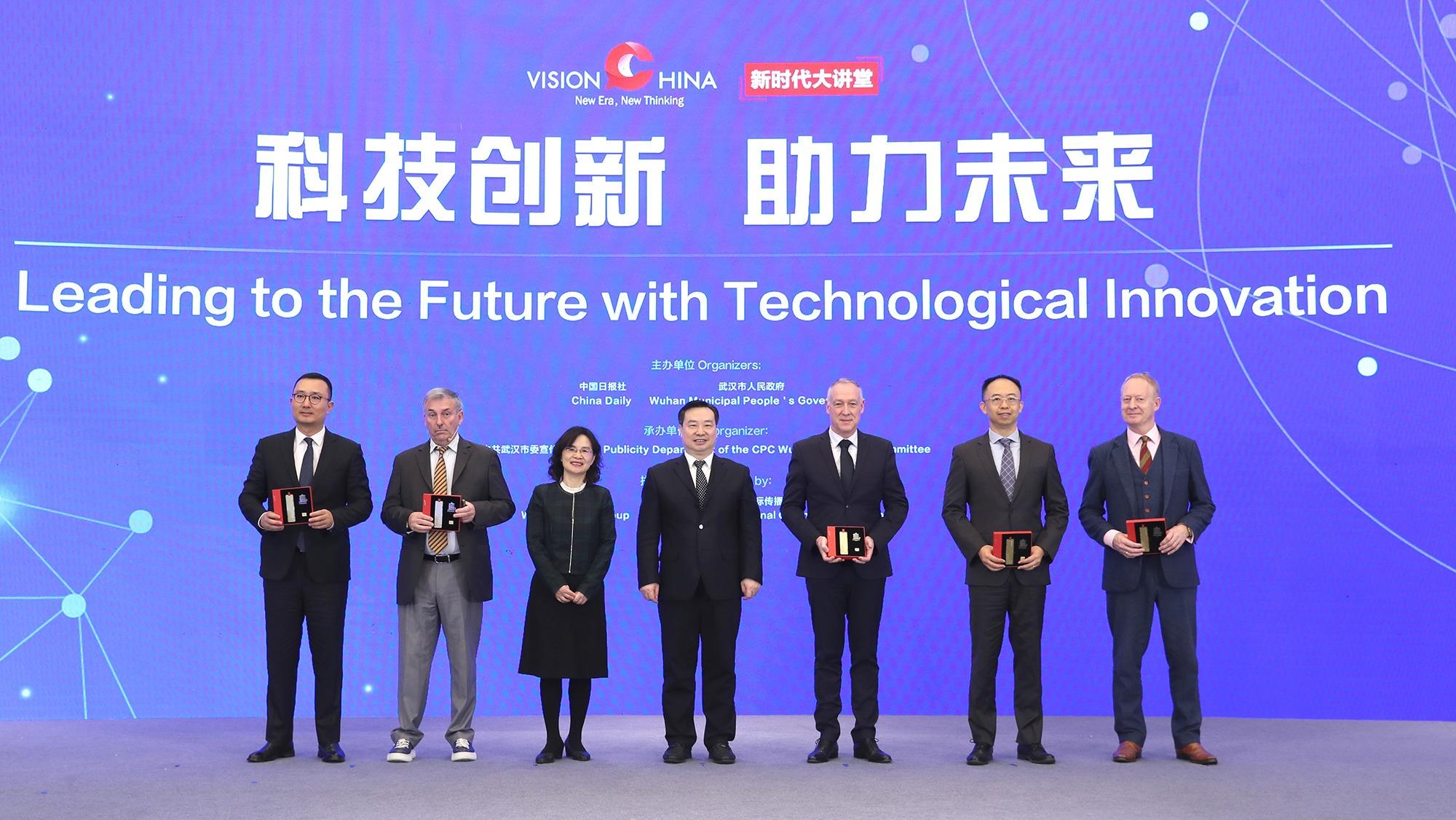 Guest speakers at a Vision China event with the theme of “Leading to the Future with Technological Innovation” receive souvenirs from organizers in Wuhan, Hubei province, on Nov 6, 2023. (ZOU HONG / CHINA DAILY)
Guest speakers at a Vision China event with the theme of “Leading to the Future with Technological Innovation” receive souvenirs from organizers in Wuhan, Hubei province, on Nov 6, 2023. (ZOU HONG / CHINA DAILY)
Editor's note: Five speakers from diverse industries outlined the key trends and capabilities of their respective fields, including manufacturing, artificial intelligence and agricultural technology, at the Vision China event in Wuhan, Hubei province, on Monday.
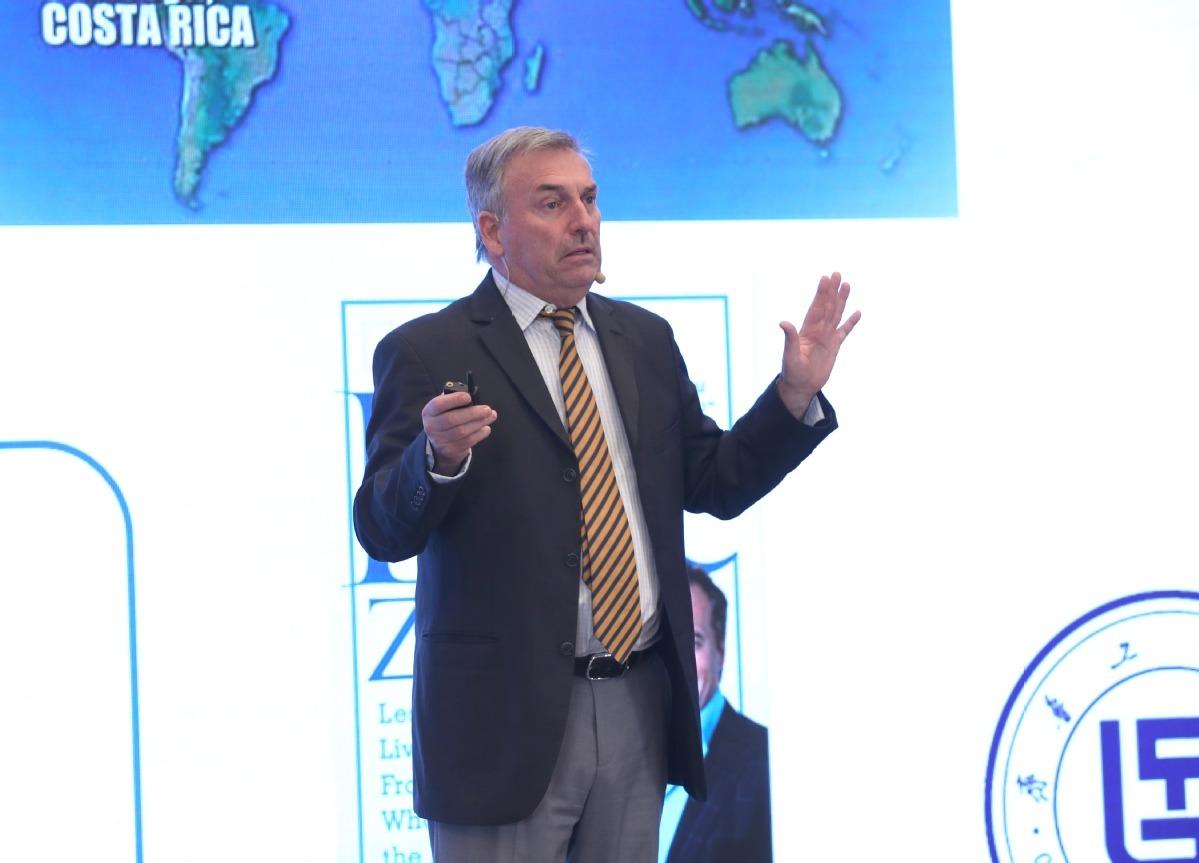 Charles Mackay. (ZOU HONG / CHINA DAILY)
Charles Mackay. (ZOU HONG / CHINA DAILY)
Poor lifestyle choices can bring on disease
Unhealthy lifestyles and dietary habits are posing a growing threat to human health, leading to a surge in lifestyle diseases, warned Charles Mackay, a renowned scientist and fellow of the Australian Academy of Science.
Speaking at a Vision China event in Wuhan, Hubei province, Mackay emphasized the urgent need for innovative and safe drugs to combat immune-related diseases, including Alzheimer's, cardiovascular conditions and diabetes.
Mackay, honorary president of the School of Pharmaceutical Sciences at Qilu University of Technology in Shandong province, and former chief scientific officer for inflammation and immunology at pharmaceutical company Pfizer in the United States, warned of the detrimental impact of modern lifestyles on global well-being.
He highlighted the critical role that dietary choices play in determining human health outcomes, drawing from research on longevity zones worldwide.
According to Mackay, embracing diets rich in dietary fiber, such as vegetables and nuts, while maintaining control over calorie and sugar intake, can significantly benefit one's health. He further advocated the use of metabolite diets, which focus on the combined effects of various dietary components, over single-molecule drugs.
Mackay concluded his speech by expressing his optimistic outlook on the future of disease treatment. He believes that the scientific community is on the brink of a revolution in healthcare, wherein innovative medicines will be developed to effectively address a range of diseases, ultimately leading to improved human health and well-being.
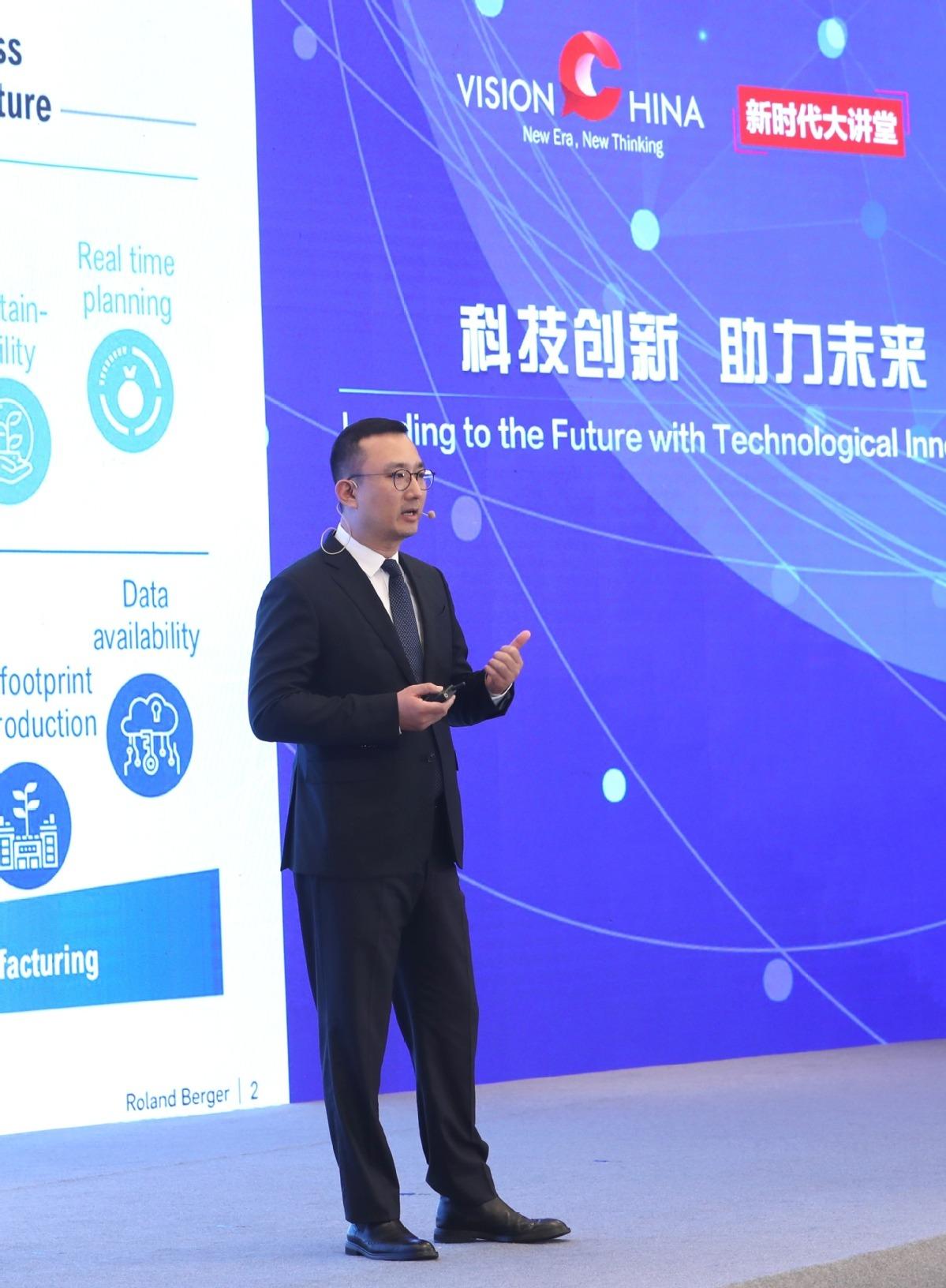 David Zhu. (ZOU HONG / CHINA DAILY)
David Zhu. (ZOU HONG / CHINA DAILY)
Manufacturing trends can boost competitiveness
Competitiveness is no longer determined only by products and cost, and some new trends in manufacturing can help boost a company's competitiveness, David Zhu, partner and leader of digital transformation services at Roland Berger China, said during the latest Vision China event held in Wuhan, Hubei province, on Monday.
He said customers now care about carbon footprints, and they demand a technology shift from fuel-powered to battery-powered products.
Customers want de-risked, short supply chains and personalized products. In addition, customers and governments favor brands and products with local heritage, and customers demand shorter lead times and real-time manufacturing status, Zhu said.
"The demand of customers has opened a window for companies to differentiate their manufacturing. Companies could set up a carbon-neutral production facility, and shift the production workforce skill set toward battery and electrical production processes," Zhu said.
For example, with its first fully electric sports car, Porsche made its Taycan production facility in Zuffenhausen, Germany, fully carbon neutral.
Customers are looking for environmentally friendly practices, and Porsche has shown competitive advantages from brand perception and encouraging sustainability, he said.
In addition, enterprises could adopt local or regional manufacturing strategies to stay close with customers. Companies could also upgrade their manufacturing with 3D printing or highly flexible production machines.
For instance, with the adoption of resin-based 3D printing technology, Switzerland-based Sonova Holding, the world's biggest hearing solutions provider, has been on the forefront of on-demand customized hearing-aid production.
Digital manufacturing processes have eliminated the traditional time-consuming handcrafting process, and Sonova has competitive advantages in the mass customization of hearing aids, Zhu said.
Meanwhile, companies could establish their manufacturing in locally favored places. Companies could also link sales and manufacturing in planning, and connect shop-floor manufacturing with live data, Zhu noted in his speech.
Thus, companies face an inflection point, as they either address the trends and boost manufacturing competitiveness or run the risk of a creeping loss of competitiveness.
"Companies must carefully design the road maps, and consider both customer perception and competitors' moves. If done well, manufacturing can turn from a perceived liability into a true asset," Zhu said.
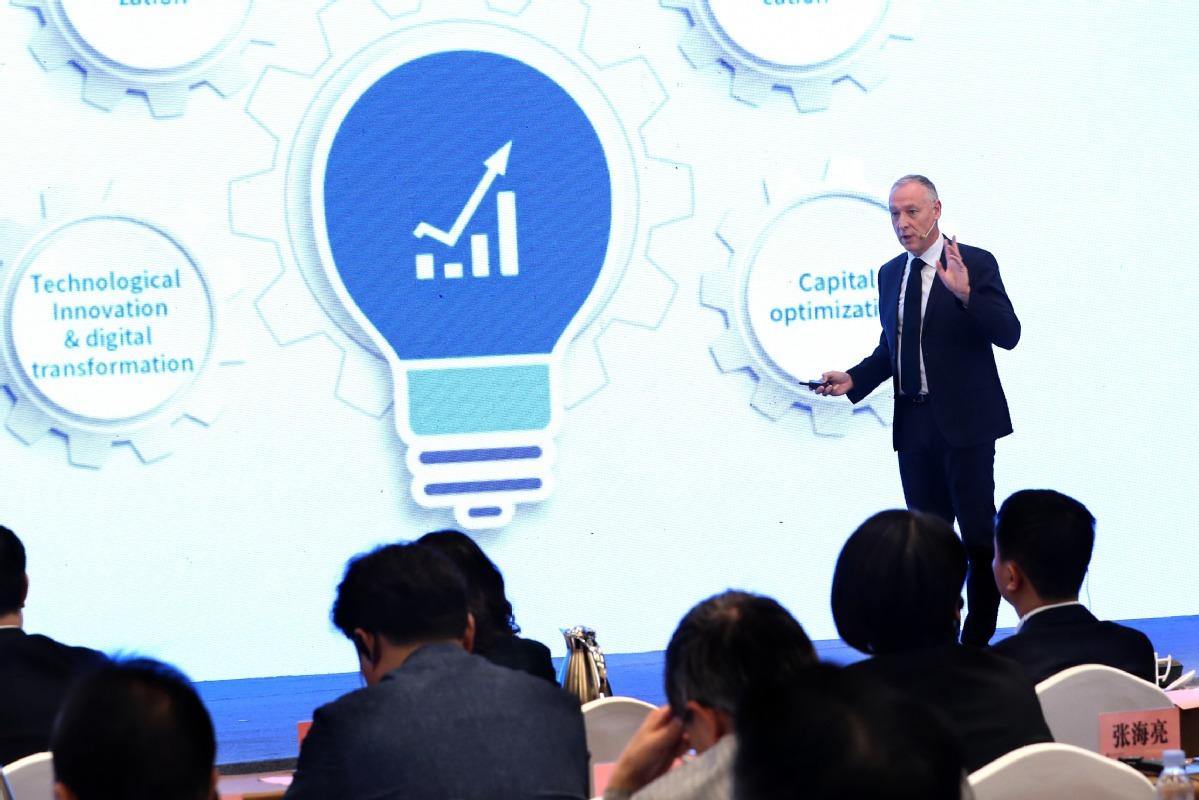 Jan Bongaerts. (ZOU HONG / CHINA DAILY)
Jan Bongaerts. (ZOU HONG / CHINA DAILY)
Fiber optic firm sees big growth opportunities ahead
Yangtze Optical Fibre and Cable Joint Stock Limited Company, a global leader in optical communication, is bolstering the development of the optoelectronics industry and helping build Wuhan, Hubei province, into a technological innovation hub.
Jan Bongaerts, senior vice-president of the company, said its optical fiber networks have advantages such as large transmission capacity, ultralow latency and cover a long distance, and are of vital importance in accelerating digital transformation in industries including logistics, transportation, healthcare, mining and education.
Bongaerts said the explosive growth of remote working, cloud gaming, artificial intelligence and virtual reality, especially during the COVID-19 pandemic, increased demand for bandwidth and optical fiber.
The digital economy is thriving as a major driver of GDP growth in many countries, and optical fiber networks are regarded as the best choice for digital economy infrastructure.
"We are very active in telecom and data centers, submarine cables and recently also in semiconductors," Bongaerts said.
Established in 1988 in Wuhan, the company saw its revenue reach $2.01 billion last year. It has more than 10,000 employees and has offered products and services to over 90 countries and regions.
The company has been instrumental in the early stages of developing China's communication network. It has supplied 40 percent of the fiber optic cables utilized in the construction of China's vast communication network, Bongaerts said, adding the company has mastered three key technologies for manufacturing optical fibers.
He underlined that the company is striving to promote technological innovation and advance the development of a globally competitive optical communication industry cluster within the Optics Valley of China in Wuhan.
In 2017, it established the world's largest, most technologically advanced facility for optical fiber in Qianjiang, Hubei province.
In addition, it has stepped up its push to expand in overseas markets. It has six overseas production bases for cable and fiber and over 50 offices abroad, in an effort to export innovative solutions and advanced technologies to the world and to build a high-quality optical fiber network to enhance digital connectivity and enrich the digital lifestyle.
Looking ahead, Bongaerts said the company remains committed to innovation and growth, aiding the city in its quest to become a significant center for technology innovation in China.
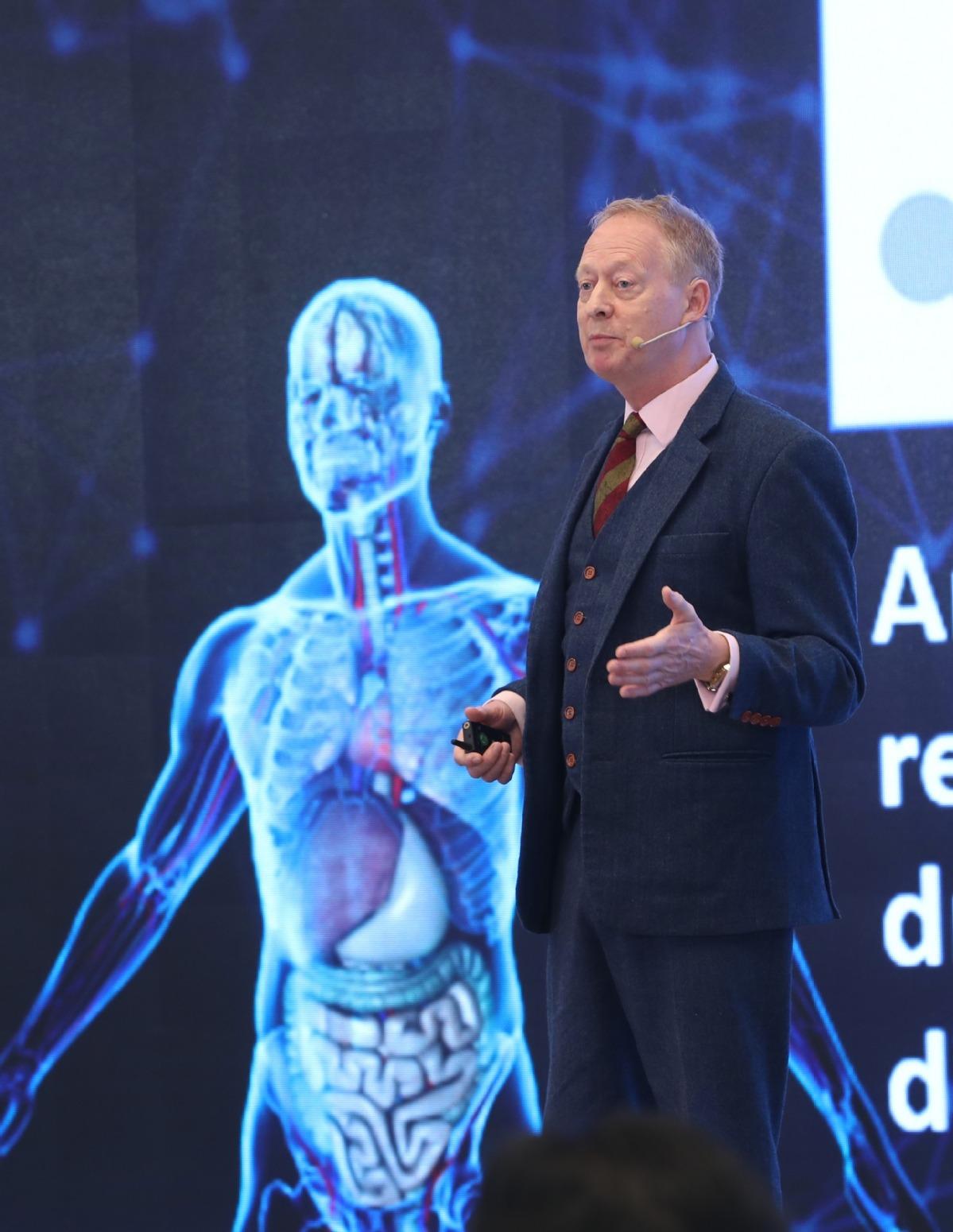 Simon Haworth. (ZOU HONG / CHINA DAILY)
Simon Haworth. (ZOU HONG / CHINA DAILY)
Technology to power China's next-gen success
China is on the path to becoming a generator of technologies rather than a service provider, and that's why foreign businesses invest in high tech, according to a British entrepreneur whose family has done business in China for nearly 150 years.
Simon Haworth, a British entrepreneur and investor involved in the biotechnology and agritech markets, said at a Vision China event in Wuhan, Hubei province, on Monday that he has high hopes for his own forays into China.
Haworth visited Wuhan for the first time in 2012 and later established a biotech company in the city that seeks to use artificial intelligence to understand disease biology, thus enabling the company to discover new drugs.
He appreciated the help from his Chinese business partners who showed him the potential of Wuhan, which he knew nothing about previously.
"The most important thing we should be focusing on with all our policies is establishing one-to-one connection between individuals, and that can start from our children," he said.
He added that one-to-one connection has made a massive difference in delivering help and understanding for all sorts of issues in very practical terms.
The business ties between Haworth's family and China started with a suggestion from a business partner, Haworth said at the event held by China Daily and the Wuhan People's Government.
"My great-great-grandfather met someone in Manchester who was from Jardine Matheson international firm, and they were looking at switching from the cotton trade to the silk trade. And next thing we're importing silk from Jiangsu," said Haworth.
When he took his eldest son to China, he became the sixth generation in a continuous line to engage with China.
His grandparents visited Wuhan in 1963. The family has a video of them being shown the first bridge over the Yangtze River, which had been built a few years earlier, he said.
Besides biotechnology, Haworth believes the agritech market has great potential in the future as it will do more for human health than biotech in the years ahead.
"It's absolutely right that China is not a service provider. China needs to be the owner, participator and generator of technology," he said.
With the new vision in mind, Haworth is confident about starting the new chapter of his family's story with China.
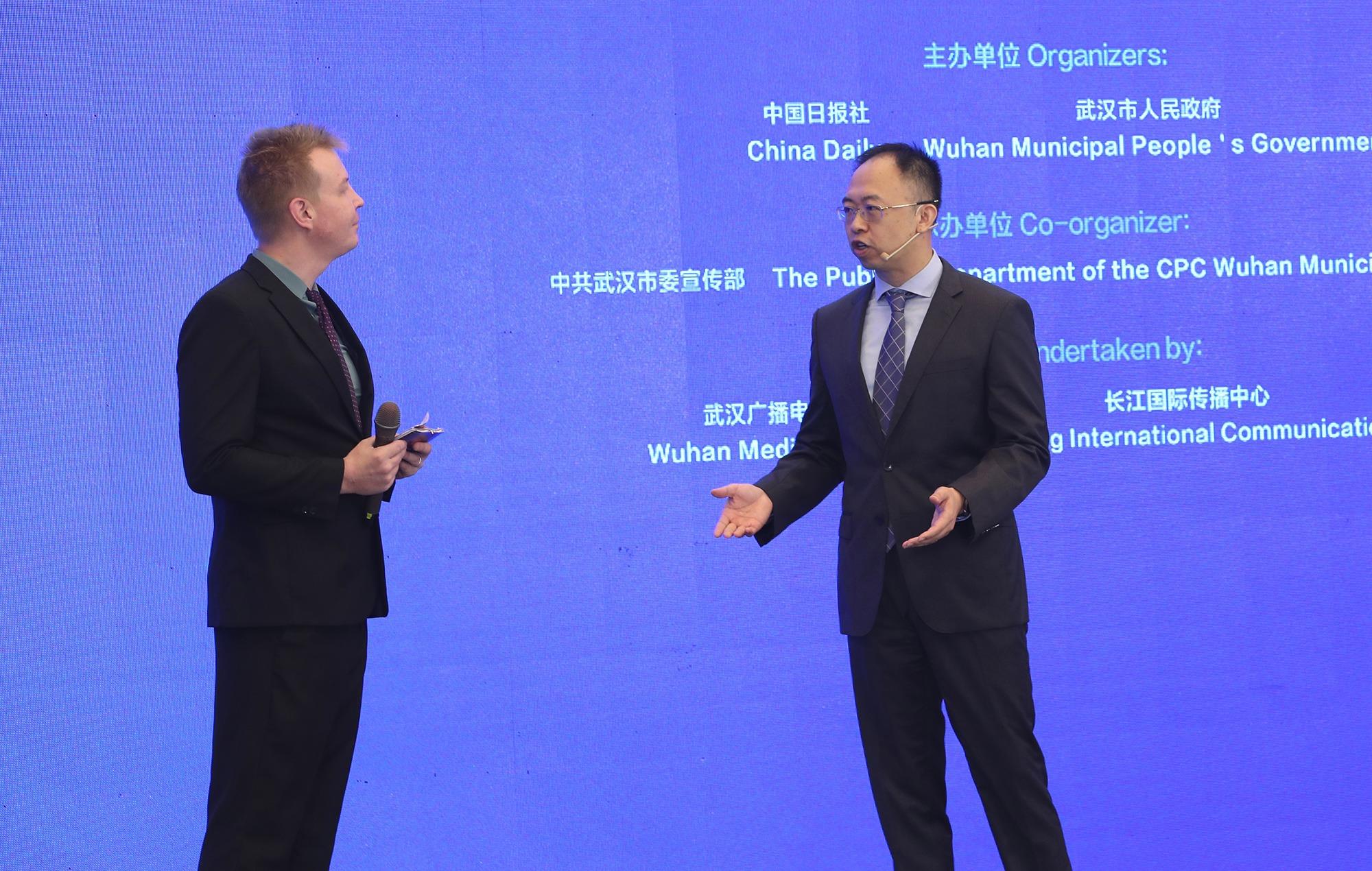 Fan Zhiyong, vice-president at Huawei Technologies, shares his thoughts in innovation and intellectual properties at the Vision China event in Wuhan, Hubei province, on Nov 6, 2023. (ZOU HONG / CHINA DAILY)
Fan Zhiyong, vice-president at Huawei Technologies, shares his thoughts in innovation and intellectual properties at the Vision China event in Wuhan, Hubei province, on Nov 6, 2023. (ZOU HONG / CHINA DAILY)
Patent protection to safeguard innovation
While working closely with partners around the world to lead in innovation, technology companies also need to help them protect their intellectual property, according to Huawei's vice-president.
Technology companies are no longer just a dozen titans. Instead, there are countless small and medium-sized enterprises in the sector from every corner of the world, and Huawei has been working with them to make customized solutions, which the company is very proud of, Fan Zhiyong, vice-president and head of the intellectual property and legal affairs department at Huawei Technologies, said on Monday.
"Our engineers in China will not be effective in writing a program to manage traffic in Sao Paulo. That must be done by some Brazilian software developers. We are pretty good at providing advanced hardware and artificial intelligence models to make their job possible. Digitalization of industries requires global innovation. There's no alternative," Fan said while delivering a speech at Vision China in Wuhan, Hubei province.
The event was themed "Leading to the Future with Technological Innovation".
The globalization of innovation has changed the landscape of intellectual property protection, he said at the event jointly held by China Daily and the Wuhan People's Government.
"As Huawei shares its technologies with the community of 4.6 million developers globally, protecting the company's intellectual property is of paramount importance. However, what I recognize becoming more challenging and important is that our local developers must be able to protect their intellectual property too," he added.
He added that many of those companies are startups that have fewer resources and are vulnerable to intellectual property infringement, but they can be based anywhere in the world. If their work is copied by their competitors, they would have no future, and Huawei would have no future.
"In the past, protecting intellectual property was mainly about a few big and developed countries, where the largest technology companies are. But now, intellectual property protection must be enforced globally," he said.
China now has specialized courts for intellectual property disputes, administrative proceedings designed to adjudicate such disputes in three months, and mediation centers throughout the country. And because of the country's continuous improvements in intellectual property protection, many advanced technologies have been developed in China, Fan said.
"My company took a chance and became a leading technology company, and we are not alone in China. In this new world of global innovation, the same success can take place in any country where there's good intellectual property protection," he said


